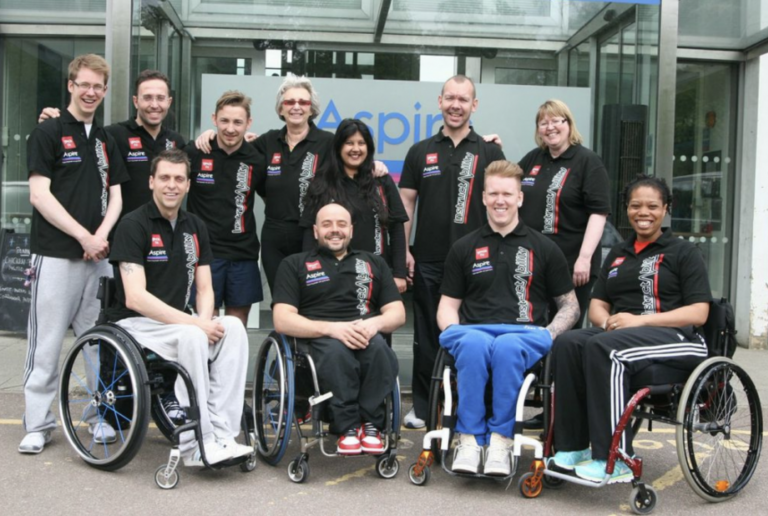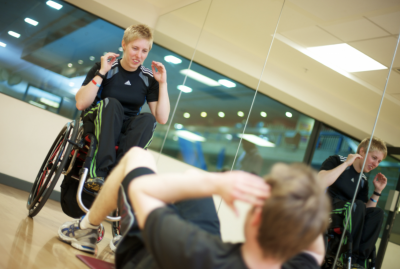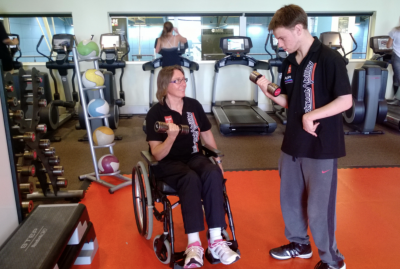InstructAbility programme wins Disability Award for breaking down barriers within fitness industry
6 February 2018
We would like to congratulate Aspire for winning the top prize in the Disability category at 2017’s Charity Awards for their InstructAbility programme.

The InstructAbility scheme enables people to qualify as fitness professionals. The award, which was presented at a black-tie ceremony at the Tower of London on Thursday 8th June, recognises InstructAbility’s success in making the fitness industry more accessible and inclusive.
Whilst the benefits of physical activity for individuals with disability have long been recognised, less than 8% of the 11 million disabled people in the UK are estimated to be achieving the recommended levels. In particular, exercise can be slower and more intimidating for those with impeded mobility, meaning it can be harder to stay motivated. However low fitness levels can often trigger further health problems for those with a disability, affecting their sense of emotional wellbeing and hindering their rehabilitation path if they are post-injury.
Aspire Leisure Centre
Aspire’s attempts to combat this included opening of Aspire Leisure Centre in 1991 in the grounds of the Royal National Orthopaedic Hospital (RNOH), the first fully integrated fitness centre for disabled and non-disabled people in Europe. The gym possesses a wide collection of accessible equipment like a dual bike that can be operated by either arms or legs depending on limb strength, a sloped ramp into the pool so wheelchair users and others can enter easily and with dignity, courts where it is not uncommon to see a powerchair football team practising, and a range of inclusive gym classes such as seated Zumba. Crucially, attitudes within the centre do not equate having a handicap with a lack of ability and employees are unfazed to see a gym user enter with a disability – notably because 60% of the fitness professionals working there are also disabled. All this has meant that over a third of the centre’s gym users have a disability, compared to 2-3% of users within the average UK fitness centre.
The good practice at Aspire Leisure Centre showed the potential for inclusivity within fitness and provided inspiration for the InstructAbility programme. Research conducted by Aspire prior to the scheme’s launch further cemented their belief that disabled people wanting to be fitness professionals faced clear obstacles and discrimination, and that there was a need to change this. As part of their research they sent job applications to leisure centres all over the UK using two near identical CV’s, but with one stating a permanent disability and the other not. The results found that a non-wheelchair user is over three times more likely to receive an interview offer to become a fitness instructor than a wheelchair user.

InstructAbility
In light of this research Aspire partnered with YMCAfit to create InstructAbility, creating the opportunity for disabled people to become fitness professionals and obtain a NVQ Level 2 Fitness Instructor qualification, NVQ Level 3 in Exercise and Disability qualification, and a twelve-week supported work placement. The work placement is a key element that builds confidence and allows participants to practice within a working environment. Many of the leisure centres involved with the scheme have then gone on to formally employ candidates after their placement and over 80% of the centres reported a positive impact.
There have now been more than 300 graduates of the programme and they have continued their path with fitness in a variety of ways; over half have been offered employment, many volunteer part-time contributing in total over 40,000 voluntary hours of over 60,000 sessions to disabled clients, and one graduate was given the confidence to use the course as a springboard to train as a physical therapist at university.
Aspire’s origins are as a spinal cord injury charity, but the InstructAbility scheme has opened up to a much wider cohort. There has been a huge variety of successful graduates including those with spina bifida, cerebral palsy, partial or total sight loss, amputated limbs, brain injuries and many other conditions. Whilst some have always lived active lives and are injured rugby players or medically discharged military personnel, others have had very little previous experience of fitness. There is no one stereotypical participant; one of the very first people Aspire supported to qualify as a fitness professional, for instance, was a 63 year old woman named Val Ford who had lost the use of her legs since having Polio as a child.
Shifting perceptions
Participants of the programme have commented on the effect that it has had in building their self-esteem, benefitting their mental health as well as their physical health. Jude, a fitness instructor who graduated through InstructAbility notes that “When I was large I always thought that I couldn’t exercise because I was disabled but now I thoroughly enjoy exercise and it makes me feel so much better about myself”.
Crucially however, the scheme is not just about benefiting the individual participants as much as it is also about shifting wider attitudes. This effect is threefold; transforming perceptions amongst the disabled community, the fitness industry and the general public. For the disabled community, having visible representation of disability within the fitness profession is an inspiring motivator, and one of the targets of participants’ work placements is to each engage 10 other disabled community members to become physically active too.
The scheme helps to normalise disability within the fitness industry, increasing the pool of disabled fitness instructors that are available to be employed and shifting perceptions. The overall hope is that the programme will contribute positively to social change by challenging negative societal assumptions about disabled people and their physical capabilities.

The InstructAbility scheme ties into the broader work that Aspire is doing to assist rehabilitation for those with spinal cord injuries and other disabilities. A key element of this is the translational research being developed at Aspire Centre for Rehabilitation Engineering and Assistive Technology (Aspire CREATe), a joint research venture between Aspire Charity, UCL and the RNOH.
Brian Carlin, chief executive of Aspire, says: “I wish to thank everyone who has contributed to the creation and success of the InstructAbility programme and especially Hilary Farmiloe who has been leading this work for the past five years, and with her team, has achieved so much. But most importantly, to all the InstructAbility graduates who are such wonderful ambassadors for inclusion in the fitness industry.”
Moving forward
The InstructAbility programme has been running for 5 years now and Brian has stressed that he would like to see it continue to grow in strength. The eventual aim, funding permitting, would be to break down any remaining barriers to access; for example, training materials would be available in Braille and classes taught with sign language too. As attitudes and opportunities for disabled people within the fitness industry continue to shift and become more inclusive, perhaps there is some hope that schemes like InstructAbility will one day cease the need to exist. But, for now, the ground-breaking gains that the programme has been making are still much needed and are part of the reason why we are so pleased to congratulate them on their success at the Charity Awards.
 Close
Close

